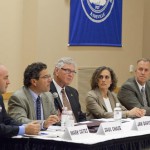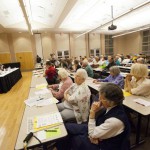- Q&A time: It’s forum season for Asheville City Council candidates, seen here at the Oct. 18 League of Women Voters forum. photos by Jonathan Welch
About 40 Asheville residents trickled into a room at the YWCA on South French Broad Oct. 20 for a candidate forum sponsored by the alumnae chapter of the Alpha Sigma Theta sorority.
It's forum season (there were three that week), but this one highlighted an issue that’s rarely discussed at such events: race and inclusivity. Topics such as development and zoning tend to take center stage at candidate forums, and while those weren't entirely absent here, the focus was on things like affordable housing and the relative lack of African-American visitors and workers downtown.
Here’s what the various candidates had to say.
Mark Cates
It was a sermon by the Rev. Billy Kyles, who worked with Martin Luther King Jr., that inspired Mark Cates to run for office, the candidate revealed. “I see where we're going in our economy and became concerned about our future,” Cates explained. “Let's be honest,” he continued. “I've been to a lot of these forums: This is the first mixed audience I've seen.”
Cates emphasized jobs, the main theme of his campaign (at another forum earlier that week, he’d even talked jobs in response to a question concerning early voting). Reducing regulation that deters businesses from locating in Asheville, he asserted, would spark economic growth that, in turn, would enable the city to improve infrastructure without taking on debt or raising taxes.
“There's 17,000 people unemployed in this city: This disproportionately affects the minority community, no question,” said Cates. “The No. 1 priority is to make Asheville a better place to do business.”
Marc Hunt
Conceding that he grew up in a privileged environment, Marc Hunt said he gained more exposure to minorities during his 10 years at the Self-Help Credit Union.
“There's a level of nonadaptation people have to coming together,” he said. “I've got lots of work to do on this front, and it's a challenge, but I'm looking forward to doing it.”
City leaders, Hunt maintained, can serve as role models by changing the way the city conducts its own business.
“We can't go business by business and make sure this changes,” he said. “But we can reinforce some opportunity. It's not simple.”
Gentrification, asserted Hunt, is making the city unaffordable for working people, and the city needs to counteract that through better education, jobs and fully supporting the Housing Trust Fund.
“We have an affordable-housing crisis in this community: The average home is out of reach for most people,” he added.
Jan Davis
The lone incumbent in the race stressed his “institutional experience.” As an Asheville native growing up just off Burton Street, Jan Davis said, “I saw diversity before diversity was really a popular thing to see. I've tried to apply those things in all the terms I've served. I grew up in a mixed-race community. … I don't forget the African-American community — or any community, for that matter.”
Davis stressed the need for improved education, especially vocational training and vouchers, to enable residents to leave public housing.
“We've got a lot of pockets of concentrated poverty,” he said. “It's our goal to make more affordable housing.”
Lael Gray
Citing her work with local nonprofit Building Bridges and her experiences as an educator and small-business owner, Lael Gray said, “I moved here because I heard the schools were good; we need to work on providing and protecting that.”
And the lack of minorities downtown, she speculated, might be “the product of economics. A lot of people don't have the disposable income to shop and eat downtown. We definitely need to address that. There's also a history in the city: There's a lack of trust. It's perfectly understandable once you scratch the surface and realize how the African-American community's been disenfranchised over and over again.
“We need to listen to the communities themselves about what they need and support those efforts,” added Gray.
Saul Chase
For his part, Saul Chase continued the emphasis on infrastructure that's been the mainstay of his campaign.
“I have a dream: It's that I can do something about the deteriorating streets and sidewalks in Asheville,” he said in explaining why he’s running for Council. “People ask me are you just running about streets and sidewalks? Well, yes and no, because it's also our neighborhoods. When the house gets messy, you really don't feel that good. That happens in our neighborhoods too.”
Chris Pelly
“Neighborhoods United,” the theme of Chris Pelly’s campaign, includes Asheville's minorities, the candidate explained.
“A lot of my purpose in this campaign is to listen and learn; there's no easy answers here,” he noted. “We have to be working to make housing affordable, folks, through incentives. It's a complex thing.” The public, added Pelly, needs to have input on development in the city, instead of letting staff make all the decisions.
“This is the ninth candidates forum we've done, and honestly, the exchanges are the best I've seen so far,” he said later.
A longtime community leader, Pelly touted his success in getting sidewalks and parks in Haw Creek.
Policing the police
All six candidates agreed on two points: supporting the quarter-cent sales tax for A-B Tech and not having the Police Department enforce immigration law.
Staff accountability, particularly the Police Department, was a major point of discussion. Davis asserted that the current system works, even putting in some good words for former APD Chief Bill Hogan (who resigned in the wake of a scandal over the handling of evidence). But Davis added that he’s disappointed in the department’s lack of minority recruits, noting, “There's an unfortunate perception that they're not going to do well. We have to improve the diversity of our firefighters and police.”
Cates said Asheville could take a cue from Chicago's community-policing efforts. Pelly favored appointing more community liaisons. Hunt said, “We need accountability, from the city manager on down.”
None of the candidates directly favored establishing a full-blown police-oversight board, though they all said the existing advisory board needs to be strengthened.
“The police have a very important job: That doesn't mean they get to do whatever they want,” noted Chase, calling for semiannual reports on the state of the APD.
Gray went further, asserting that the advisory board needs to have some teeth. “If we keep it all internal, there are cover-ups; we've seen that,” she said.
— David Forbes can be reached at 251-1333, ext. 137, or at dforbes@mountainx.com.






Cover-ups? In WNC?
Well I’ll be hornswoggled.